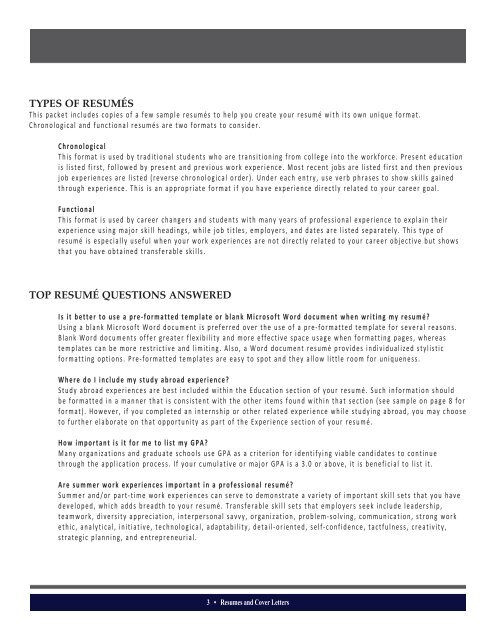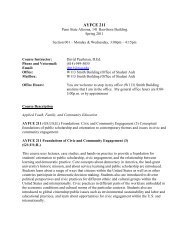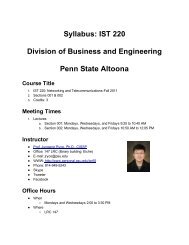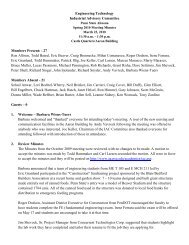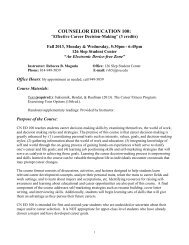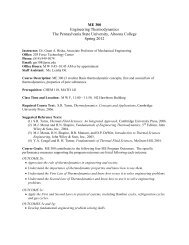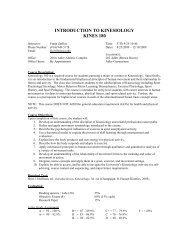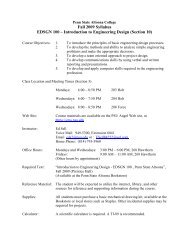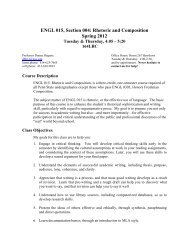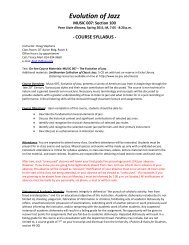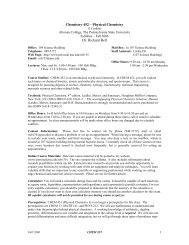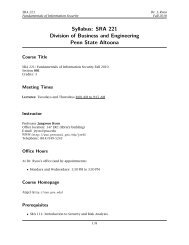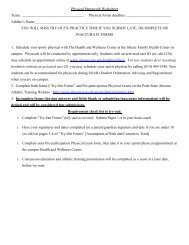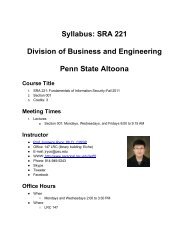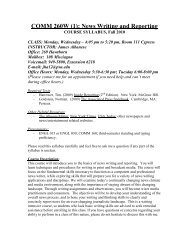Career Services - Penn State Altoona - Penn State University
Career Services - Penn State Altoona - Penn State University
Career Services - Penn State Altoona - Penn State University
You also want an ePaper? Increase the reach of your titles
YUMPU automatically turns print PDFs into web optimized ePapers that Google loves.
TYPES OF RESUMÉS<br />
This packet includes copies of a few sample resumés to help you create your resumé with its own unique format.<br />
Chronological and functional resumés are two formats to consider.<br />
Chronological<br />
This format is used by traditional students who are transitioning from college into the workforce. Present education<br />
is listed first, followed by present and previous work experience. Most recent jobs are listed first and then previous<br />
job experiences are listed (reverse chronological order). Under each entry, use verb phrases to show skills gained<br />
through experience. This is an appropriate format if you have experience directly related to your career goal.<br />
Functional<br />
This format is used by career changers and students with many years of professional experience to explain their<br />
experience using major skill headings, while job titles, employers, and dates are listed separately. This type of<br />
resumé is especially useful when your work experiences are not directly related to your career objective but shows<br />
that you have obtained transferable skills.<br />
TOP RESUMÉ QUESTIONS ANSWERED<br />
Is it better to use a pre-formatted template or blank Microsoft Word document when writing my resumé<br />
Using a blank Microsoft Word document is preferred over the use of a pre-formatted template for several reasons.<br />
Blank Word documents offer greater flexibility and more effective space usage when formatting pages, whereas<br />
templates can be more restrictive and limiting. Also, a Word document resumé provides individualized stylistic<br />
formatting options. Pre-formatted templates are easy to spot and they allow little room for uniqueness.<br />
Where do I include my study abroad experience<br />
Study abroad experiences are best included within the Education section of your resumé. Such information should<br />
be formatted in a manner that is consistent with the other items found within that section (see sample on page 8 for<br />
format). However, if you completed an internship or other related experience while studying abroad, you may choose<br />
to further elaborate on that opportunity as part of the Experience section of your resumé.<br />
How important is it for me to list my GPA<br />
Many organizations and graduate schools use GPA as a criterion for identifying viable candidates to continue<br />
through the application process. If your cumulative or major GPA is a 3.0 or above, it is beneficial to list it.<br />
Are summer work experiences important in a professional resumé<br />
Summer and/or part-time work experiences can serve to demonstrate a variety of important skill sets that you have<br />
developed, which adds breadth to your resumé. Transferable skill sets that employers seek include leadership,<br />
teamwork, diversity appreciation, interpersonal savvy, organization, problem-solving, communication, strong work<br />
ethic, analytical, initiative, technological, adaptability, detail-oriented, self-confidence, tactfulness, creativity,<br />
strategic planning, and entrepreneurial.<br />
3 • Resumes and Cover Letters


